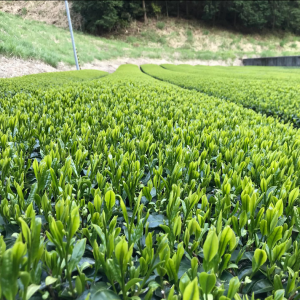
Marishi (摩利支) is named after the Buddhist guardian deity called Marishiten in Japanese.
Meant for sencha production, this is an extremely early budding cultivar.
History of Marishi
In present day Shizuoka city, Mr. Yamamori and his daughter selected the best seedling that resulted from natural crossing of Yaeho tea plants.
In 1993, they applied for the Seed and Seedling Law registration.
The Marishi cultivar was finally registered in 1996.
Characteristics of Marishi
Marishi can be picked about 10 to 14 days earlier than Yabukita.
Its mature leaves are elliptical in shape and somewhat small.
They have a green color, and few creases on their surface.
Younger leaves have a longer elliptical shape, and a medium size and thickness.
They have a deep green color with luster.
In addition, they are rather soft.
Young Marishi tea plants have a medium yield, but it becomes higher as they age.
This cultivar offers a medium resistance against cold weather, it’s somewhat strong against anthracnose, strong against the gray blight, but very weak against the bacterial shoot blight.
As a sencha, Marishi tea leaves can be tightly wound and have a deep green color as well as luster.
Its aroma is deep and sweet, similar to that of mochi.
This is considered to be a good aroma.
Once brewed, it has an intense umami taste.
Chemically, Marishi has a high amount of amino acids, while the caffeine and catechin content is relatively low.
This cultivar is always described as being “very rare”.
I hope that I can taste it one day.
